My wife and I can’t shake the desire to move elsewhere. Even during times when we’re living somewhere great, surrounded by friends and culture and beauty, we’ll unroll a map and start dreaming of other places where we might pitch our camp. For the most part we want to move abroad, despite the challenges and impracticalities of making such a move with children. We’ll dive down every rabbit hole—researching the schools and demographics, imagining which neighborhoods we would live in and the restaurants we would frequent. And as we begin to obsess over the possibility of transplanting, we’ll grow temporarily blind to the wonderful things about our current home. We can’t quit the habit. We left the Bay Area during the pandemic, abandoning a mostly perfect place for us, but at the time, the move was easy to justify—we’d grown distraught with the Bay Area’s environmental issues and the cost of living, while drawn away by a wish to be closer to family and a hunger for new experiences—and the pandemic provided a license to shake things up.
So two years ago, we left Oakland and landed in the Hudson Valley in a town on the river. We bought an old farmhouse, walking-distance to hiking trails, a charming Main Street, and an art museum; the creek across the street cascades into waterfalls a block away; we have much easier access to the grandparents’ houses; and we’re only 90 minutes by train to New York. It’s an ideal place for us in so many ways. In choosing Beacon, we basically threw a dart at a map; we’d only briefly visited once prior to moving here, and we didn’t know anyone in town. Getting established took many months, but finally we started to find a community.
The kids settled in much more quickly. They seemed to have collected a pack of friends by the end of their first day of school who would shout to them from passing cars and say hello at the farmers’ market. How the hell do you know these people? we’d ask, doing a pretty poor job of hiding our envy.
A friend recently reminded me, You’re only as happy as your least happy child. So I guess we should put away the maps and settle in, having landed in a good place for the kids. And yet…
Kids are also pretty damn skilled at adapting, especially when they’re young. So if we were to decide to pack up for a new frontier, they would most likely adjust and be okay. Would moving somewhere new be the best thing for them? I truly don’t know. It’s a matter of weighing stability against experience, easy contentment against adventure. My wife and I probably discuss and debate this topic more than any other.
For the past two weeks, we’ve been visiting friends in Sweden on the southern edge of Stockholm. It was a magnificent trip, with daily jaunts into the city, great food and company, a couple days biking around Copenhagen, and some nights in the star-filled countryside, where we had a summer crayfish party and foraged for chanterelles in the forest.
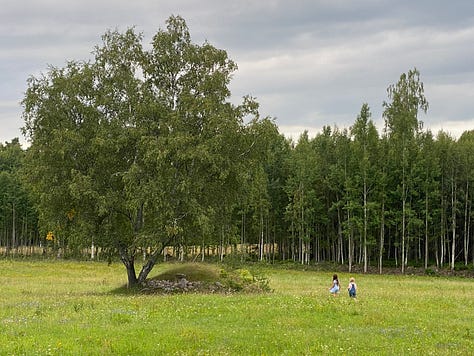
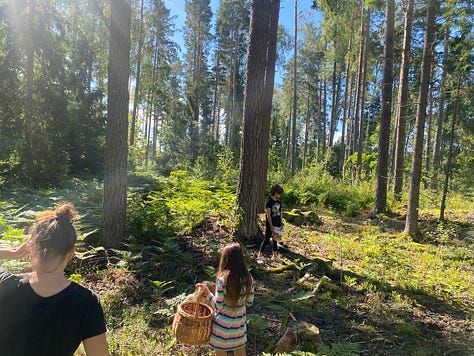

Inevitably: Should we move with the kids to Scandinavia? I sat sipping a coffee in a park in Copenhagen on a perfect August afternoon, watching a hundred kids running and laughing and chasing one another, and I imagined our children among them. An hour later, I sat down for an interview with the great chef René Redzepi (coming soon here on Hey Pop) and asked him what it was like to raise a family there. Basically I wanted him to persuade me to move to Copenhagen. And man, he made a strong case. So now that’s one more entry on the growing list of places where we dream of living.
But I’m not sure all this dreaming is healthy. There’s something wonderful about spending years anchored to a single spot, whether it’s your birthplace or an adopted home.
And I should take a minute here to recognize the privilege of even being able to dream about moving around the globe or to visit friends in Sweden. We’re lucky, and we have nothing to complain about. And yet we can’t seem to sit still.
One autumn afternoon when I was 20, I’d returned east from college and was staying in a small cabin on the western bank of Lake George in the Adirondacks. My family had gathered there for some occasion, and I sat beside the lake looking across the water at peak foliage, the reds, golds, and oranges reflected in the lake’s surface. A feeling struck me that could only be described as epiphany. I felt as if I’d just uncovered the key to my future happiness. This is my landscape, I understood, more than anywhere in the world. I knew that no matter where I traveled and lived from that point on, I would someday need to return to the lake country of the Northeast in order to feel like I was home.
I was born in the Arizona desert, an opposite landscape in every way, but we moved to Upstate New York when I was ten, and my most significant formative years were spent running through the woods of the Northeast.
I don’t recall if I’d read the great California poet Robinson Jeffers by the time of that epiphany in the Adirondacks, but his idea of inevitable place has always resonated with me, the notion that for each of us, there exists a location or landscape that will make us feel complete. It may be where we were born, or it may be somewhere we discover in our wanderings, and suddenly we’re home.
Jeffers’ boyhood was spent bouncing between the steel capital of Pittsburgh and boarding schools in Europe. In his mid 20s he decamped for the central California coast with his new bride, Una, and they never left.
“When the stagecoach topped the hill,” Jeffers wrote of their arrival in 1914, “and we looked down through pines and sea fogs on Carmel Bay, it was evident that we had come without knowing it to our inevitable place.”
Jeffers built a house and tower from the granite stones of the shore. His residence, called Tor House, is now a museum which I highly recommend visiting if you find yourself near Carmel-by-the-Sea.
Robinson and Una raised their twin sons there. His volumes of short lyrics and his long, strange novels-in-verse contain all the violence and beauty found in the natural world of his adopted home.
He died in Carmel nearly a half century after his stagecoach topped the hill. And Jeffers saw his inevitable place change in many ways during those decades, as more people arrived, erecting their neighborhoods and planting their lawns over the wilds around him.
Carmel Point
by Robinson Jeffers
The extraordinary patience of things!
This beautiful place defaced with a crop of suburban houses—
How beautiful when we first beheld it,
Unbroken field of poppy and lupin walled with clean cliffs;
No intrusion but two or three horses pasturing,
Or a few milch cows rubbing their flanks on the outcrop rockheads—
Now the spoiler has come: does it care?
Not faintly. It has all time. It knows the people are a tide
That swells and in time will ebb, and all
Their works dissolve. Meanwhile the image of the pristine beauty
Lives in the very grain of the granite,
Safe as the endless ocean that climbs our cliff.—As for us:
We must uncenter our minds from ourselves;
We must unhumanize our views a little, and become confident
As the rock and ocean that we were made from.
I previously wrote of a day when I met with Anthony Hopkins in a Santa Monica hotel room to record him reading poems. A few moments from that session were especially memorable.
To start, Hopkins read to me from his own tattered volume of Yeats, and as I sat holding the mic, I noticed that he’d scrawled columns of mysterious symbols in the margins. They resembled circled asterisks, and there were twenty or more of these runic symbols filling the space beside many of the poems. I asked about them, and he said that each time he recited a poem, he would scratch a line, then cross it when he read the poem a second time, cross it again, and so on, circling the symbol on the fifth reading. He found that once he’d read a poem a dozen times or so, he had committed it to memory. These symbols revealed that he’d revisited many of the poems with astonishing dedication, a hundred times or more.
Hopkins told me on that afternoon in Santa Monica—this was around 2005, so he was in his late sixties—that that day was the first time he’d ever read a poem aloud to another person. I’ve had a hard time believing that could be true, considering his long career on the stage and screen, but there was a certain shyness about him, and poetry clearly occupied a very private and special place for him.
Anthony Hopkins’ boyhood and teenage years were spent beside Swansea Bay in Wales, a place immortalized by Dylan Thomas’ rhapsodic poem, “Fern Hill.” The two great artists were born there only ten miles apart. In the hotel room that day, Hopkins pulled out his own worn edition of Thomas and asked if we could record “Fern Hill.” He arranged the book in front of him at our small rectangular table, nodded to me when he was ready, and then began to perform the poem. His pace was quick at first, like a boy running through a field. And then something remarkable happened. Hopkins’ voice snagged on a line; he paused, and then began to cry. He stopped reciting and paced the room, mumbling an apology. When he sat back down, he asked if we could start over. We did, and then it happened again—Hopkins reached a particularly moving turn in the poem, and he was overcome by emotion and stood up from his chair. The third time this occurred, he sat back down and looked up at me. “I’m very sorry,” he said, tapping the page with a finger. “This is my childhood.”
We finally got a full take of the poem, and since then, I can only hear it his voice. Lines from “Fern Hill” frequently float back to my ear, brought on by a scene or a color or a shift in climate—passing horses in a field, for instance, or walking in the Hudson Valley during apple season, or driving in Sweden through fresh drizzle toward a friend’s warm home.
My day with Anthony Hopkins was five years or so after that moment in the Adirondacks. The power of what I felt on the shore of the lake hadn’t dimmed, and so as I sat with Hopkins and saw him overtaken by memory and longing, as he was transported by “Fern Hill” back to the lush and verdant Wales of his youth, I understood in some small way what he was feeling. There we sat in Santa Monica, talking into a microphone, with the endless golden Pacific sun igniting our hotel room, so many worlds away from his beloved Wales, where he’d been green and carefree.
It’s that tension that I keep troubling over as my wife and I continue to settle into our new home while still itching to get back out into the world, thinking about our own inevitable places and considering the same for our children.
Here is Hopkins reciting “Fern Hill” on that afternoon. The poem was first published in October 1945, only a month after the end of the war, when Dylan Thomas was 31, and young Tony Hopkins, at age 7, was running around the yard of that grammar school you see in the photo above.
Fern Hill
by Dylan Thomas
Now as I was young and easy under the apple boughs
About the lilting house and happy as the grass was green,
The night above the dingle starry,
Time let me hail and climb
Golden in the heydays of his eyes,
And honoured among wagons I was prince of the apple towns
And once below a time I lordly had the trees and leaves
Trail with daisies and barley
Down the rivers of the windfall light.
And as I was green and carefree, famous among the barns
About the happy yard and singing as the farm was home,
In the sun that is young once only,
Time let me play and be
Golden in the mercy of his means,
And green and golden I was huntsman and herdsman, the calves
Sang to my horn, the foxes on the hills barked clear and cold,
And the sabbath rang slowly
In the pebbles of the holy streams.
All the sun long it was running, it was lovely, the hay
Fields high as the house, the tunes from the chimneys, it was air
And playing, lovely and watery
And fire green as grass.
And nightly under the simple stars
As I rode to sleep the owls were bearing the farm away,
All the moon long I heard, blessed among stables, the nightjars
Flying with the ricks, and the horses
Flashing into the dark.
And then to awake, and the farm, like a wanderer white
With the dew, come back, the cock on his shoulder: it was all
Shining, it was Adam and maiden,
The sky gathered again
And the sun grew round that very day.
So it must have been after the birth of the simple light
In the first, spinning place, the spellbound horses walking warm
Out of the whinnying green stable
On to the fields of praise.
And honoured among foxes and pheasants by the gay house
Under the new made clouds and happy as the heart was long,
In the sun born over and over,
I ran my heedless ways,
My wishes raced through the house high hay
And nothing I cared, at my sky blue trades, that time allows
In all his tuneful turning so few and such morning songs
Before the children green and golden
Follow him out of grace,
Nothing I cared, in the lamb white days, that time would take me
Up to the swallow thronged loft by the shadow of my hand,
In the moon that is always rising,
Nor that riding to sleep
I should hear him fly with the high fields
And wake to the farm forever fled from the childless land.
Oh as I was young and easy in the mercy of his means,
Time held me green and dying
Though I sang in my chains like the sea.


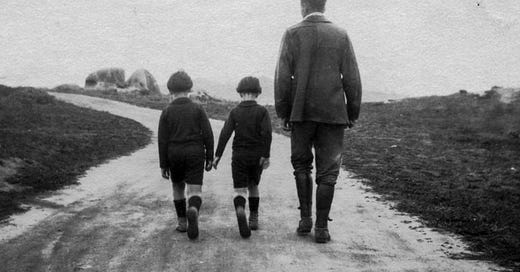





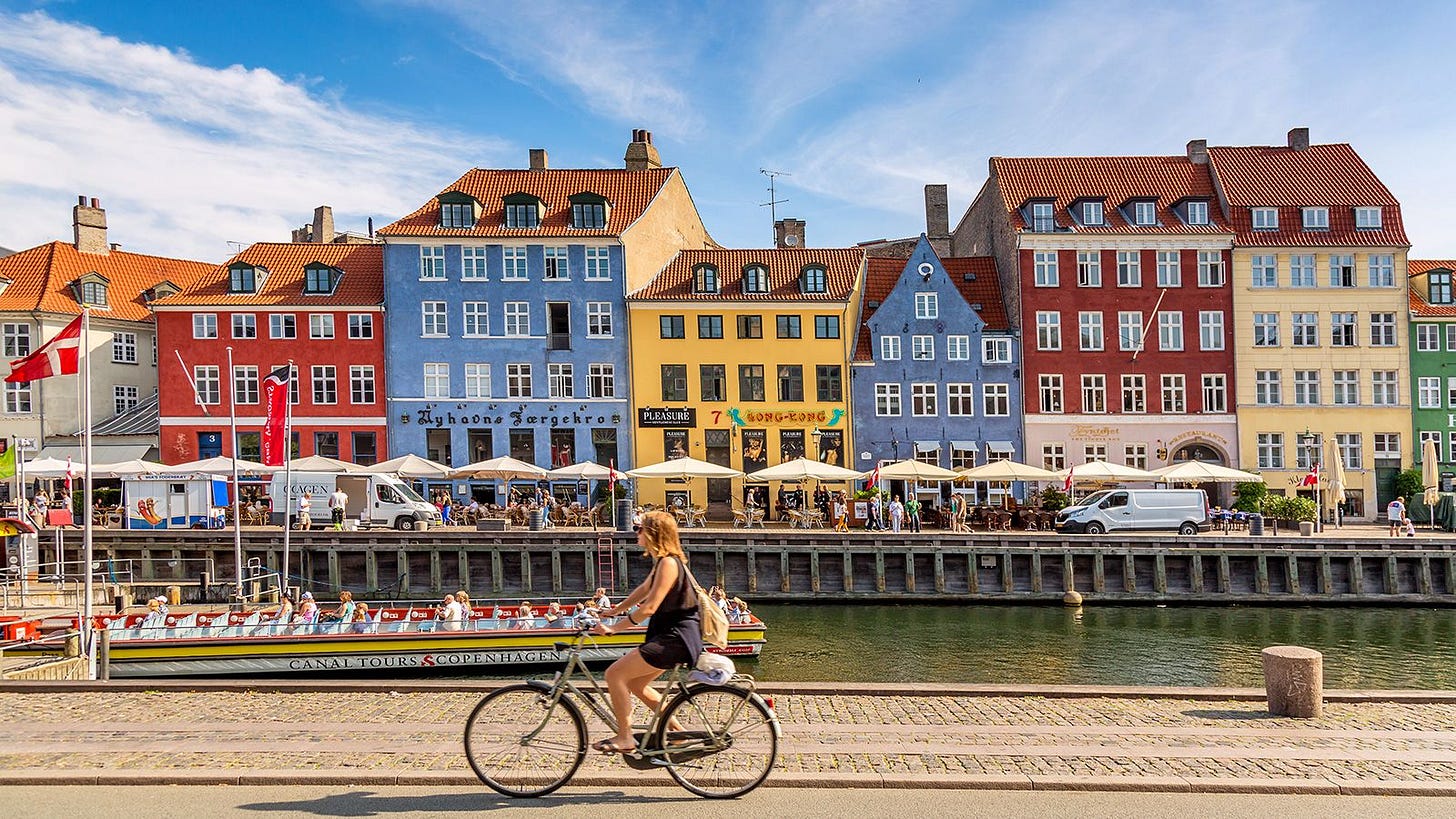
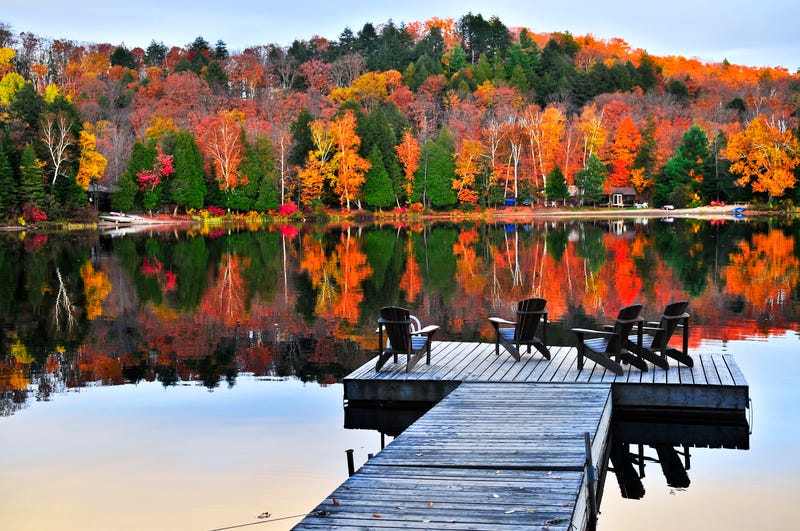
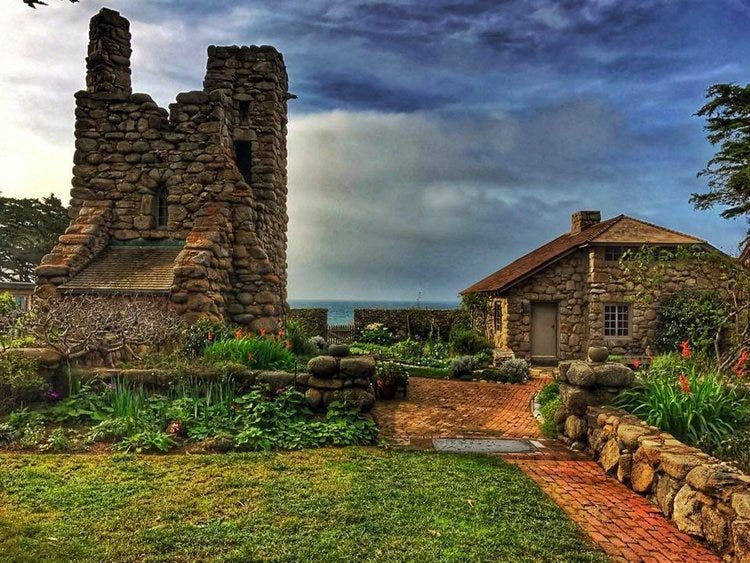





Beautiful description of that Urge for Going... move to London!
Thinking about moving all the time is not always healthy, as you eloquently describe. In my experience, which includes three international moves in the past ten years, two of them with kids, it's the moving itself that sharpens that desire the most. It makes you see what's possible, but once you know what's possible it's easier to be unhappy where you are. Here I am, living abroad, and you know what I dream about? Moving to upstate New York.
It took me years to realize that I have the causality all wrong. I tend to think it's the place that makes me unhappy. Maybe it's the people, or the weather, or the food. Those are the problems, I tell myself, and they don't have anything to do with me. In reality, I often become unhappy because of something completely unrelated to where I live, and then use the place as a scapegoat for my unhappiness. This is a much easier trap to fall into when I remember that I have a choice about where I live.
The solution, for me anyway, is not to stop dreaming. Instead, I try to remember that I'm unlikely to be any happier anywhere else. So I dream, of course, and I also try to find ways to understand why I'm feeling what I'm feeling, and whether it's actually related to where I live. And that's a skill I can take anywhere.